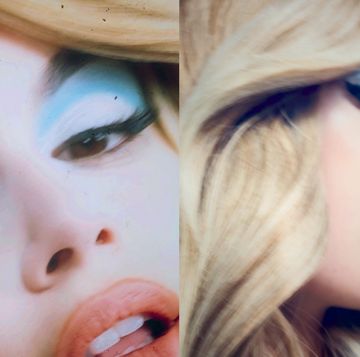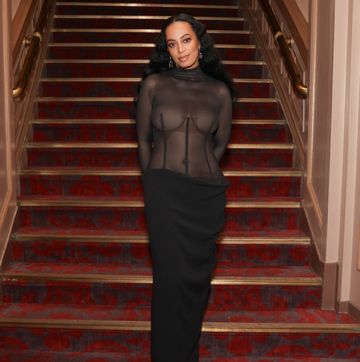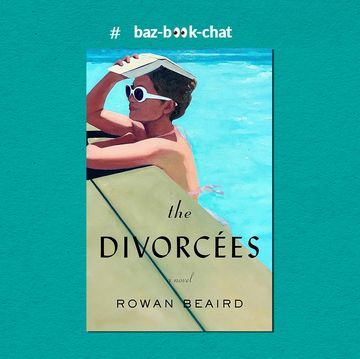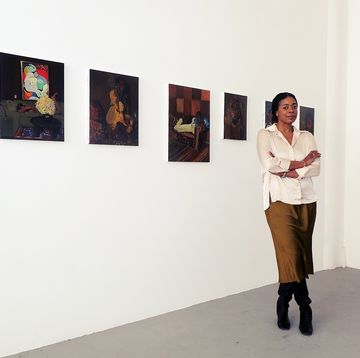Depending on who you ask, Hozier is the king of yearning. Or maybe he’s the king of lesbians. Or is he the king of the forest? No, no—he’s a fairy king, right? Whatever crown you want to place atop his captivating auburn locks, he is undeniably king of the charts, with his 2013 megahit “Take Me to Church” having been certified this summer at 13x platinum. His self-titled debut album is now 3x platinum and his second full-length, 2019’s Wasteland, Baby!, has been certified gold. Only time will tell as to the long-term success of his third and most recent album, Unreal Unearth, but it already debuted in August at no. 1 across multiple charts. And most dates on Hozier’s tour behind Unreal Unearth—including his first-ever show at Madison Square Garden, on September 30—have sold out.
Ten years after the release of “Take Me to Church,” the Irish singer is selling out arenas. What does that feel like for him?
“It feels really, really encouraging,” Hozier admits over Zoom, from his tour bus in Louisville. It is mid-September, and he is in Kentucky for the Bourbon & Beyond music festival. “I think the fact that these tickets were sold before the album was out was super encouraging to me, too. People didn’t really know what the new album was going to sound like, and they were still ready and really wanted to show up.”
Hozier (full name Andrew John Hozier-Byrne) is notoriously careful about his private life, but has revealed that several of the songs from Unreal Unearth are the results of a breakup and other personal losses he’s experienced over the course of the pandemic. He worked the album largely around the concept of Dante’s Inferno, the epic poem about the 14th-century Italian poet’s journey through the nine circles of Hell. “Francesca,” one of the singles, is based on a character from the second circle (for sinners guilty of lust) who was, in turn, based on Francesca da Rimini, a real-life medieval noblewoman who fell in love with her husband’s younger brother, Paolo. A modern power ballad, the song is an ode to love’s occasional recklessness—daring, devoted, braggadocious, and unrepentant. Hozier croons and then belts his passion. The eroticism of the line “I’d tell them, ‘Put me back in it’” electrifies the song, which ends with a hypnotic choral round that includes the avowal “Heaven is not fit to house a love like you and I.”
The sacrilegious power of love is a common theme throughout Hozier’s catalog, but Unreal Unearth is his most intimate album yet. You’d be hard pressed to get him to open up to the public about any details beyond the lyrics themselves, but does he ever try to fight against personal inspiration to avoid fan scrutiny?
“I think the art filters through all sorts of different layers of sediment and rock until it filters out of the spring,” he says. “It goes through all sorts of different filters that are psychic and emotional. So I think the ultimate question is … does the work feel honest to me? And I can’t really consider all too much more than that.” If he needs to check in with someone about the content of a song, he does, but he’s much more concerned about authenticity than about parasocial detectives.
Hozier may find comfort in maintaining a certain level of mystery. Earlier this year, a Spotify user shared a playlist titled submissive men !! that featured four Hozier songs, including “NFWMB,” from his 2018 EP Nina Cried Power. The musician finds his inclusion on the playlist “interesting” and raises his eyebrows at the idea that he might have some songs out serving as theme music for all the subby boys out there.
“I think I’m glad most people don’t know me all that well,” he says. “Sometimes I think the negative space between me and the actual me and fans is filled with very, I think, attractive descriptions of myself or attractive imaginings of myself.”
But he does agree that “NFWMB,” which stands for “Nothing Fucks With My Baby,” is a good choice for such a playlist. It’s about a lover who stands by your side at the end of the world and includes a verse full of arousing viciousness: “If I were born as a blackthorn tree / I’d want to be felled by you / Held by you / Fuel the pyre of your enemies.” Hozier concedes: “There’s great dedication in that song. It describes a kind of an outrageous admiration and dedication towards a figure, and it kind of describes a very terrifying person in the best way. So yeah, ‘NFWMB,’ I can agree with you.”
He also understands that listeners will hear and interpret what they will. “Ultimately, the listener finishes the piece in some way, shape or form. They bring their experience to it, and their experience bridges the gap between themselves and the song,” he says. (Justice for everyone who’s used “Cherry Wine”—whose gentle, romantic melody belies a story about intimate partner violence—as their wedding song.)
That said, he doesn’t want his music used for causes he doesn’t support. “What I’m concerned [with] is if it gets co-opted for something that’s harmful or deliberately harmful,” he says, his voice becoming firmer with his conviction. For as many love songs as Hozier sings, he is equally committed to social justice and calling attention to inequality and oppression. In “Butchered Tongue,” from Unreal Unearth, he highlights the colonialist practice of forcing indigenous peoples to abandon their mother languages. He also directly references pitchcapping, an ancient form of torture famously used by the English to put down the Irish Rebellion of 1798. Pointing out the atrocities of the world is as important to him as declarations of undying love.
“I'm very interested in Irish history, but I find that Irish history– it’s one little microcosm of something that happened across the world, you know what I mean? And so my understanding, the history of my place, where I come from—it informs my understanding of imperialism, of global imperialism, and it informs my understanding of global power structures,” he says. “They’re part of my psychic makeup, just from what I understand of my own country’s history, my own nation’s history. … It colors the lens, as it were, with how I see the world.”
Hozier’s 2018 single “Nina Cried Power” featured legendary Black singer and activist Mavis Staples. It’s an anthem dedicated to the legacy of social protest. In June 2020, he donated the royalties from “Jackboot Jump,” a song that mocks military and fascist response to protest, to the NAACP and Black Lives Matter, in response to the death of George Floyd. It’s impossible for Hozier to ignore such injustices, especially when people misuse his name to try to justify their biases.
That summer, as the United States reeled from the brutality of Floyd’s death at police officers’ hands, the Hozier 24/7 fan group on Facebook began deleting comments that referenced the killing, Black Lives Matter, or anything else “political” (a.k.a. Black). In response, Hozier himself tweeted a light scolding. It’s baffling that anyone could listen to his work—which is directly inspired by and frequently pays homage to Black music—and decide to ban what is ultimately a discussion of Black life.
Hozier seems to agree. “I felt like I couldn’t, in good conscience, not intervene into what would seem outrageous to me in a way, or just seemed deeply insensitive,” he says. He knows the problem isn’t confined to this one incident or this one fan group and appears frustrated by the need to reiterate the respect and love he has for Black artists.
“This is kind of part of the wider thing … I can talk about my influences being of Black artistry. It’s mentioned all the time. It is in the work. It’s literally in the work … and it’s just something that is not taken seriously,” he says.
Black fans have often taken to social media to express their own frustration at how white fans conveniently ignore Hozier’s tributes to Black artists, praising him instead as a ridiculously tall forest elf from a magical land far, far away. But Hozier says it’s natural for him to pay homage, to take care of the work he’s built his own on.
“It just seems strange that it wouldn’t be part of the conversation,” he says. “And it’s so fundamental to my influence. I named the songs after Black artists, and the work is signposted constantly back to it. I just try to be honest with it as best I can, and try to approach that conversation with the spirit of honesty and openness.”
That open approach is a part of his appeal. Hozier’s poetic lyricism can be emotionally devastating. The night after a show in support of Unreal Unearth, I went to a bar with a friend. A bottle of rosé deep, I got choked up, wondering if anyone would ever love me enough, or ever be so inspired by love as to dedicate a song as beautiful as “To Someone From a Warm Climate (Uiscefhuaraithe)” to me. The song is a special gift Hozier wrote for someone who had never experienced a cold winter, and references the Irish word for “the feel of coldness only water brings.” His voice moves between the dips and swells of his range as he sings it, and every time I hear the song, I have to figure out new ways to keep my heart inside my chest. The sensual vulnerability of Hozier’s music is at its peak in this song.
Unreal Unearth is his most musically and emotionally textured work so far. It may have been inspired by Dante’s Inferno, but the album is more like Pandora’s box. In the midst of all the ways it show us that love and greed can leave us devastated, it still offers hope that arriving on the other side of it all, into the light, will be worth it.

Nichole Perkins is the author of Sometimes I Trip on How Happy We Could Be (Grand Central Publishing, 2021).














